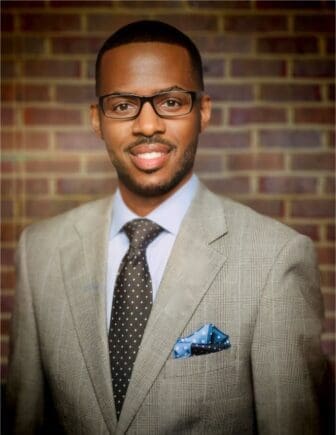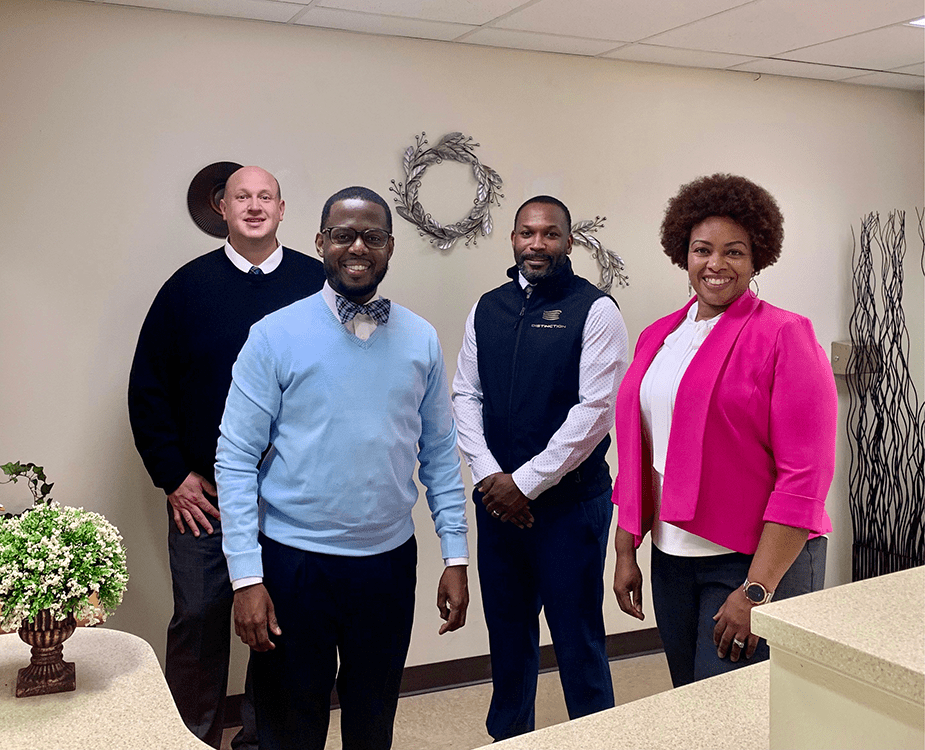Distinction, LLC

Korey Adams is not new to Job Corps management. He has more than 20 years of experience in the industry, traveling the country for various jobs. He returned to the Mississippi Delta, where he was born, to bring work to an area facing economic development challenges.
He decided to start his own business in Job Corps management and filed the necessary paperwork. Distinction, LLC, was established on April 5, 2017, in Greenville, Mississippi. While working to build his business, he continued to work a full-time job.
In early 2019, Korey attended a workshop on economic development in rural areas. He started a conversation about starting a business with the woman sitting next to him. The woman turned out to be Ines Polonius, CEO of Communities Unlimited (CU).
“I’m a man of faith,” Korey said. “Some people would call it just happenstance. I call it divine connection.”
“As only fate would have it, Ines and I happened to be sitting beside each other at the same table.”
She told Korey about the services and resources CU offered for entrepreneurs, and it sounded like the perfect fit.
“She appeared to show a lot of interest in what I was trying to do,” he said of Ines. “She talked about the services that Communities Unlimited provided, and some way, somehow, she connected me to the individuals at Communities Unlimited.”
Ines referred Korey to a CU Entrepreneurship Team, became his main point of contact. Together they conducted an initial assessment to discuss Korey’s goals and needs for his business.
One of the first tasks was to create a sound business and financial plan, complete with three-year projections for the company. The information was needed as part of the Small Business Association (SBA) 8(a) business certification and HUBZone program. The SBA 8(a) certification is designed “to help provide a level playing field for small businesses owned by socially and economically disadvantaged people or entities,” and the HUBzone program “fuels business growth in historically underutilized business zones (SBA.gov).
Over the next few months, Korey gathered the needed information for the business plan scope and projections; by July, the plan was complete.
It was during that summer that Korey also decided to give Distinction his complete attention. He left his job and began working at Distinction full time, putting all his energy into building his business and obtaining clients and contracts.
Korey understood how Job Corps worked, but translating it into a traditional business format understood by financial institutions and investors was more difficult. Working with CU, he was able to translate that knowledge into a “bankable” business language.
“Communities Unlimited began to give me insight into the financial aspects and understanding all of those elements, not only from the perspective of the industry that I knew well but what it meant in terms of being an entrepreneur,” he said.
“One of the things I’ve shared with Communities Unlimited is that I’m learning new jargon. I’m learning a new language. I’m learning new ways to think like bankers and financial institutions,” he said. “I can tell you what the direct costs are in Job Corps contracts. I can tell you how G&A and overhead work for federal contracting. I can tell you how the fee structure works for this industry. But translating that to the world of banking? If it’s not for the Communities Unlimited of this world, I would be totally lost.”
With the goals, projections in a typical business format in hand, Korey set out to apply for government contracts for facilities management. The federal government runs Job Corps centers across the United States that train youth ages 16-24 in trade skills while completing their high school education. The management of Job Corps centers is operated by various management agencies that oversee the facility.
Distinction, LLC, applied for Job Corps management contracts in various locations.
On November 11, CU received an email from Korey. He had exciting news about his business, and he wanted to share it.
Distinction, LLC, had been awarded a contract for management work at a government facility in Roswell, New Mexico. The five-year contract totaled over $42 million.
As great as the news was for both Korey, he knew this meant there was a lot of work to do.
The most pressing issue was finding startup capital for the contract. Initial projections indicated the Distinction needed between $350,000 and $390,000 in capital to move the contract forward.

Partnership for Rural Transformation
With the acquisition of the contract, the need for capital took top priority. The question was, where was Korey going to get nearly $400,000 in capital? How would he find investors for a small, minority-owned business that was only three years old?
“What must be demonstrated to the government in terms of that financial capability is the ability to carry the contract financially over a one- to two-month period,” he said. “To come up with the sort of capital and collateral that traditional banks want to see in order to access those types of finances is an uphill climb.
“Communities Unlimited, with its capabilities, with its extensive network, has been vital in helping me to identify those partners that can assist with the capital that’s needed, as well as playing a significant role in being a contributing member,” he said. “Without CU, I don’t see how small businesses, minority-owned businesses, businesses that are in economically distressed communities, could ever attempt to be successful at the level that I see Distinction is going to be able to achieve here in the near future.”
In 2018, CU, a Community Development Financial Institution (CDFI), was part of the Persistent Poverty Work Group, which became the Partners for Rural Transformation (PRT). The partnership is a collaborative of six regional CDFIs with a shared vision: A country where persistent poverty no longer exists.
The partner organization serves 75% of the country’s persistent poverty counties, from the Mississippi Delta to the rural West. Persistent poverty counties are defined as counties or parishes where 20% of the population have lived below federal poverty levels for more than thirty years. The designation includes some 30 million people in the United States.
Korey worked with PRT to collectively gather the capital necessary for his businesses. The funding allowed Distinctions to begin the work required to start its contractual obligations.
Korey said the company has been aggressive in bidding for Job Corps contracts. He said he expects his work with Communities Unlimited will continue.
Korey said Communities Unlimited is a vital resource for any small business, especially those just starting out or in economically challenged areas.
“All small businesses struggle with a couple of things,” he said. “They struggle with capacity building, and they struggle with, ‘how do I take this vision that I have and how do I turn it into a business model?’ And I think the Communities Unlimited of our society is absolutely essential for helping small businesses that already have sparse resources.”
“Taking that vision, taking those ideas, and being able to marry them to actual components of what’s necessary for the business is essential,” he said.
“Take advantage of the services that Communities Unlimited provides,” he said, even if some of the advice isn’t what you were hoping to hear. It’s still all for the best, he said.
“Their ‘tough love’ in this case has helped to set Distinction up for some enormous success that will go with us for the rest of our days.”

